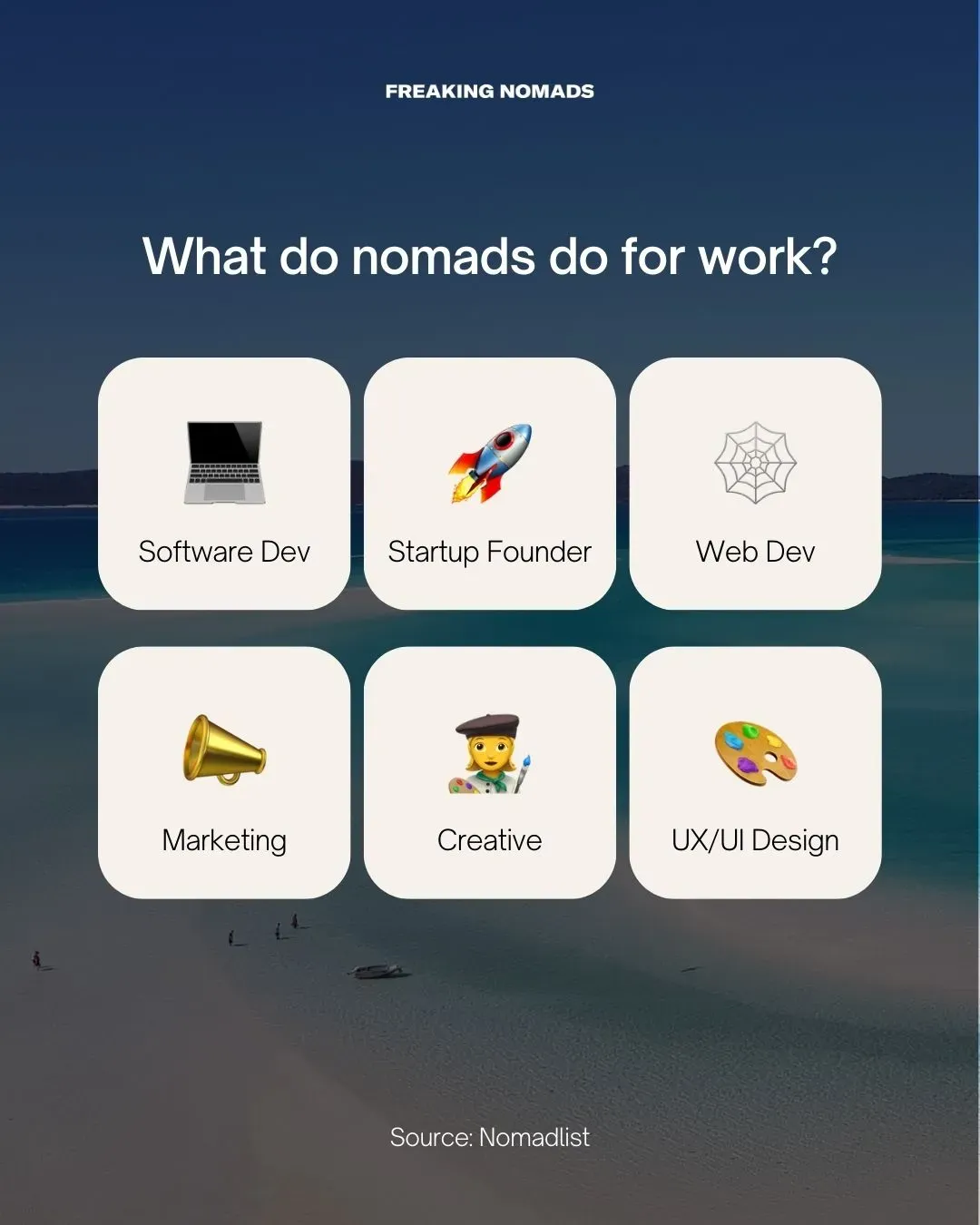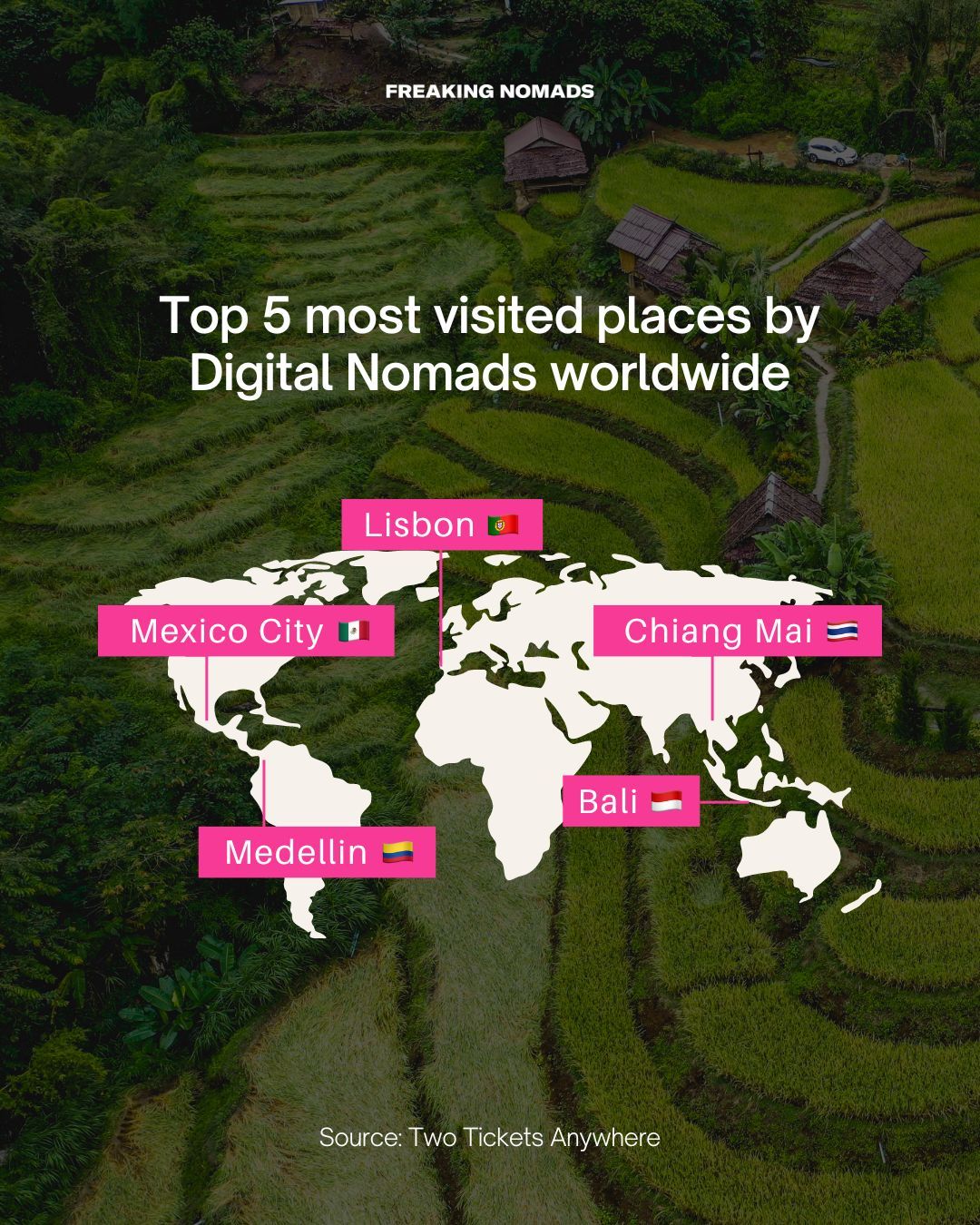Being able to travel the world while working is a dream for many, but this seemingly ideal type of lifestyle is often misunderstood by the average person.
In this article, we will talk about all things digital nomads: What are they? What do they do? How do they do it? And above all, how can you become one?
We also clarify which jobs can allow you to travel full-time, and how to take the leap and become a digital nomad yourself.
What is a Digital Nomad?
The simplest definition of a digital nomad is a person who travels while working remotely, thanks to their laptop and a good internet connection.
In my opinion, however, a better definition would be:
Digital nomads are people who work remotely and therefore do not need to be in a physical office. Their ultimate goal is to live their life in the pursuit of freedom, whether from a location, financial, or professional standpoint.
How to Become a Digital Nomad

‘How can I become a digital nomad’ is probably one of the most searched questions on the internet by people who are thinking about making this change.
But let's start by clarifying one thing: digital nomadism is not a job or a career but a lifestyle, a way of approaching life and achieving personal freedom.
So, in more concrete terms, how can you achieve this type of freedom and how can you start living as a digital nomad?
The only criterion is to be able to work remotely, either from your laptop or smartphone. Whether you would like to travel full-time indefinitely is a personal choice that can occur later down the line or even change over time.
What Digital Nomads Do?
If you need to be able to work remotely to become a digital nomad, you might ask what types of work can be done remotely?
Every digital nomad has a different job. However, the types of jobs digital nomads usually work can be divided into three main categories:
- Freelancers
- Remote Employees
- Entrepreneurs
Let's analyze each category one by one.
1. Freelancer
A freelancer is a self-employed professional who can choose who to collaborate with and which projects to participate in.
It is one of the most popular categories among digital nomads because it allows them to have a little more flexibility. After all, you are your own boss, and it’s in any freelancer’s best interest to look after and cultivate client relationships.
The downside, however, is that everything is on the freelancer’s shoulders and it's not always simple to manage your own life. It definitely requires a lot of planning and discipline.
Learn more here:

2. Remote Employees
This is a type of job that many digital nomads consider a temporary solution, as it often puts limitations in terms of your own schedule and flexibility.
This is largely due to set office hours and corporate hierarchy, which may not always be as open or tolerant to digital nomads and a lifestyle that is alternative to corporate life.
Despite having to compromise a bit of freedom, it is relatively "simpler" to work as a remote employee since you can count on a salary at the end of every month and plan your life on the road accordingly.
As we know, the downside is that a salary is not guaranteed in times of crisis or mass layoffs. Moreover, you are continuously exposed to office politics.
3. Online Entrepreneurs
Becoming an online entrepreneur means starting your own online company which allows you to manage your business remotely.
Online (or digital) entrepreneurship is the most complex type of job among the three mentioned above, and the daily workload and responsibilities are much higher.
On the one hand, having people who work for you requires foresight and commitment. On the other hand, everything is then repaid by an income that usually tends to be above average.
It is certainly not impossible to become an online entrepreneur and offers a lot of satisfaction, but it is certainly more complicated to be successful.
You may also be interested in:

Which Jobs Digital Nomads Do?
In the digital world, the only limit is your imagination. Talking to other digital nomads over the past couple of years, I've discovered that there are people doing the most different jobs, some of which I never thought existed.

According to Nomadlist, IT skills such as software and web development are indeed the ones that pay the most and offer the most job opportunities over time. It is no coincidence that being a programmer is one of the best-paid jobs.
Another industry in which many people who live this alternative lifestyle work is marketing. Some examples include social media managers, copywriters, or Google ads, and paid social specialists.
Creativity is also highly sought after and, if combined with digital knowledge, is a very strong skill set. Professions that require creativity are designers, videomakers, stylists, and graphic designers, just to mention a few.
Another large chunk of remote work is also done by consultants, including those in SEO, Legal, or Finance.
This is followed by education, another popular field. Many digital nomads work as private Tutors or for companies, schools, and associations. We can also include Yoga Teachers, Personal Trainers, and Coaches in this category.
Writing is yet one of the most used and sought-after skills in many fields. Some professionals who require this essential skill are bloggers, journalists, copywriters, and book and scriptwriters.
That being said, I would like to specify that having hard skills or a degree to become a digital nomad is not always necessary. This path is much simpler to achieve and within everyone's reach than you might think.
There are in fact many jobs that do not require specific skills and that companies or businesses are regularly on the lookout for. Some examples are receptionists, customer service assistants, accountants, data entry, or VAs.
The world of remote jobs for digital nomads is virtually infinite, so there are mainly two important things to keep in mind that will make the difference in making your choice:
- You must choose a job that can be done remotely;
- It must match your skills or your natural tendencies as it will be easier for you to learn and carry out a job for which you are inclined.
If you want to get some inspiration about the remote jobs out there, check out our list of the best digital nomad jobs.
Which Are The Best Job Boards For Digital Nomads?

In order to find the first jobs and first gigs, there are many platforms today you can sign up for and search for jobs.
The most popular job board that digital nomads use every day are:
There are also platforms exclusively for remote jobs, such as:
- DailyRemote.com
- Remote.co
- WeWorkRemotely.com
- Flexjobs.com
- RemoteOK.com
- Remotive.io
- WorkingNomads.com ('Jobs' Section)
The major platforms for Freelancers, where you can sell and offer services to potential customers, are:
How Much Do Digital Nomads Make?

The shortest answer to this question is: it depends.
It would be too simplistic to provide high-level numbers or figures, but luckily there are statistics that offer us an insight into the average earnings of digital nomads worldwide.
Studies suggest that 1 in 5 digital nomads earn between $50,000 and $100,000 annually.
We also know from research that 49% of digital nomads earn a higher income than when they were employees. The same study suggests that 81% of digital nomads are satisfied with their professional situation.
Remote workers can generally expect to earn an average rate of around $10 to $30 per hour.
You may also be interested in:


But be careful: these are figures that don’t consider how much a person needs to work to get to this level, so you don't necessarily have to base your choice on these numbers. Your earnings will largely depend on your mindset, your choices, and how much you will be willing to invest in yourself.
Which Are The Top Destinations For Digital Nomads?

Because they can travel while working from their laptops, digital nomads are actively writing the modern history of many countries.
You might think I’m exaggerating, so let’s see some examples.
Before digital nomads populated the scene, the Canary Islands were a haven for wealthy retirees and senior citizens who wanted to retire in a heavenly place and enjoy the money saved up during a lifetime of work.
In more recent years, however, in the islands of Fuerteventura, Tenerife, and Gran Canaria, remote workers have been increasingly popping out from all over Europe. The lower cost of living, perfect climate, competitive tax system, and positive vibes certainly make such places great destinations for digital nomads. Not surprisingly, there are villages like Corralejo where, for example, the Italian community is even bigger than the locals!
Southeast Asia has always been a prime destination for backpackers and dreamers who were looking for pristine waters, kind-hearted people, rich history, and low living costs, so they can travel to wonderful places, spend little money and make unforgettable memories.
For some years now, however, Southeast Asia has become overrun by digital nomads so much so that the cost of living has increased due to the large influx of people who arrive every day from all over the world to settle for entire months to work from their laptops. The most famous Southeast Asian destinations that easily come to my mind are definitely Bali, Chang Mai, and Bangkok.

Even large European cities like Lisbon have recently become hotspots for digital nomads, thanks to these cities' low costs of living, exceptional beauty, and multiculturalism. In 2021, Lisbon indeed entered the list of cities with the highest quality of life in Europe. Despite this, Lisbon does not appear among the most visited European capitals, and a large part of its tourist influx, especially in the low season, is made up of remote workers.
Portugal generally appears among the favorite destinations for digital nomads. It is home to several important hubs, such as Porto, the Algarve region, and the island of Madeira, where the first ‘digital nomad village’ was founded.
Another part of the old continent that is among the favorite destinations of digital nomads is Eastern Europe. Cities like Budapest, Sofia, and Tallinn or small towns like Bansko in Bulgaria are highly sought after and highly regarded by the remote worker community.
Recently, Mexico has also become one of the most beloved places among digital nomads, thanks to beautiful places like Puerto Escondido, Cancun, and Mexico City.
What Are The Advantages and Disadvantages of Becoming a Digital Nomad?
Being able to work while traveling is certainly a lifestyle that fascinates many of us, but not all that glitters is gold.
There are pros and cons of becoming a digital nomad:
It's important to keep these things in mind and understand whether becoming a digital nomad is actually for you or not.
However, one factor might be enough to convince or discourage you from making this change: freedom.
By acquiring freedom, thanks to this lifestyle, you are not forced to move away from your family, just as it is not mandatory to travel and or be unhappy. It is up to you to do whatever you think is best with your freedom.
My personal mantra is digital nomadism is not a job or a set list of rules to follow. It's a lifestyle and a way of thinking.
You may also be interested in:

The Bottom Line
Becoming a digital nomad is possible, sustainable, and in some ways less expensive than living in a large city.
Many jobs can be done and many others that can be created. Not being able to find a job, among the thousands of opportunities the digital world offers, sounds like an excuse. Times have changed, and there are many opportunities on the web to take the leap.
Although we have seen that there are pros and cons that must be considered, in my opinion, the pros largely outweigh the cons, and I would never go back if given a chance.
The freedom you acquire is invaluable to me, and I'm a completely different person thanks to that: dreamy eyes, lightness, and a smile on my lips.
The world is full of opportunities, and in the countries with the highest rate of digital nomads, the opportunities to make new friends and find new jobs or build new skills are very high.
That said, I would recommend to anyone looking to become a digital nomad not to be influenced by those who will not support you. Those who love you will eventually support you after seeing you happy.
Give it a go and don't close doors to people. Believe strongly in what you want to do, because many people in the world like you, like me, have made it and are satisfied because they had the courage to follow their dreams.
Are You Ready To Become A Digital Nomad?
If you want more digital nomad guides like these, sign up for our free newsletter and get upcoming articles straight to your inbox!
You can also follow us on Instagram and join our Facebook Group if you want to get in touch with other members of our growing digital nomad community!
We'll see you there, Freaking Nomads!
About The Author: Federico Felici
Federico Felici, born in Rome in 1991, started his digital nomad journey in July 2021 in the Portuguese Azores. The following year, he visited several countries including the Canary Islands, Morocco, and Norway. He is a Social Media Manager and Columnist, working from around the world with his laptop. He suffers from a severe allergy to offices and an irrepressible desire to discover the world.
You can follow Federico on his social media channels:
Disclosure: Hey, just a heads up that some of the links in this article are affiliate links. This means that, if you buy through our links, we may earn a small commission that helps us create helpful content for the community. We only recommend products if we think they will add value, so thanks for supporting us!







